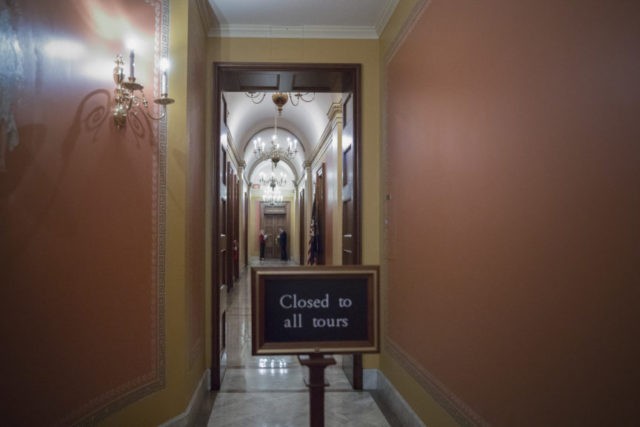The nonpartisan Congressional Budget Office is often described as a neutral arbiter of policy proposals, a score-keeper of proposed legislation. But on the subject of Obamacare’s individual mandate the CBO is anything but neutral.
Any legislation that proposes to do away with the individual mandate will invariably result in the CBO claiming that an additional tens of millions of Americans will be uninsured in the future. That’s because the CBO has an almost religious faith in the effectiveness of the individual mandate, despite strong evidence to the contrary.
In its latest report, the CBO projected that under the Senate bill 49 million people would be uninsured. That’s an increase of around 22 million people over the CBO’s forecast under current law. By far the largest source for this increase in the uninsured population is the CBO’s estimate that millions of people would drop insurance because they will no longer face a tax penalty for not having insurance. The CBO estimates that some 15 million people would voluntarily drop coverage in 2018 due to the removal of the mandate.
In effect, the CBO is claiming that the individual mandate is forcing tens of millions of people to buy coverage that they otherwise would not. But this is implausible. For starters, the mandate is just a small tax penalty with very weak enforcement mechanisms. Many more Americans have chosen to forego coverage and pay the penalty than originally estimated, likely because the penalty is small enough that it is less expensive for the young and healthy to pay the fine then purchase insurance. The government cannot impose criminal sanctions on those who do not comply with the mandate and it cannot garnish their wages or put liens on their property or bank accounts; all it can do is withhold tax refunds.
The CBO’s confidence in the power of the mandate has come under withering criticism from Avik Roy. He has pointed out that the CBO has a history of dramatically over-estimating the number of Americans who would enroll in the Obamacare exchanges. Back in 2010, the CBO estimated that 21 million would enroll in the exchanges; the actual number was closer to 10 million. Now the CBO projects that number will grow to between 18 and 19 million people, despite the evidence that enrollment is stagnating under current law. Roy estimates that the actual number in the exchanges will stabilize at around 10 to 11 million.
Roy points out just how extreme the CBO’s faith in the mandate is, describing the CBO as viewing the mandate as having “near-magical powers” to compel people to buy health insurance. Perhaps the most absurd claim made by the CBO is that five million people would drop out of Medicaid without the individual mandate–even though Medicaid is basically free to eligible enrollees. In other words, the CBO is saying that there are five million people who would prefer to go uninsured rather than accept free insurance from the government.
Even Josh Gruber, one of the most famous advocates for Obamacare and the individual mandate in particular, has recently acknowledged that the individual mandate does not seem to be very effective. In a 2016 article for the New England Journal of Medicine, Gruber and two other co-authors wrote: “When we assessed the mandate’s detailed provisions, which include income-based penalties for lacking coverage and various specific exemptions from those penalties, we did not find that overall coverage rates responded to these aspects of the law.”
As far back as 2011, the highly speculative nature of the estimates of the mandate’s impact and the CBO’s questionable role in pushing these estimates were pointed out by Princeton University Paul Starr in an article for The New Republic. “While the Affordable Care Act was being crafted, the CBO effectively shut down debate about the mandate by estimating high compliance with it and dire effects from other options. Perhaps as a result, Congress didn’t consider alternatives that might have worked—and might still,” Starr wrote.
Nonetheless, the CBO report doubles down on its faith in the mandate, creating a domino effect. It claims that the absence of those compelled to sign up for insurance by the mandate will lower the quality of the insurance pools, leaving them more heavily populated by older and sicker Americans. That will result in prices of insurance rising for those who are insured, ultimately causing even more people to drop out of the individual insurance market. But if the CBO is wrong about the effectiveness of the mandate, that’s also wrong.
The practical effect of the CBO’s position is that there simply is no way for the Republicans to produce a bill that repeals the individual mandate without triggering headlines about tens of millions of Americans losing their insurance. Given the fact that the CBO believes people will even drop free Medicaid insurance without a mandate, no amount of subsidies would be enough to overcome this.
If Republicans are going to persist in their attempts to repeal and replace Obamacare, they will have to figure out how to effectively overcome the negative publicity that will inevitably arise from the CBO’s estimate of the uninsured. Otherwise, all such plans are doomed.

COMMENTS
Please let us know if you're having issues with commenting.